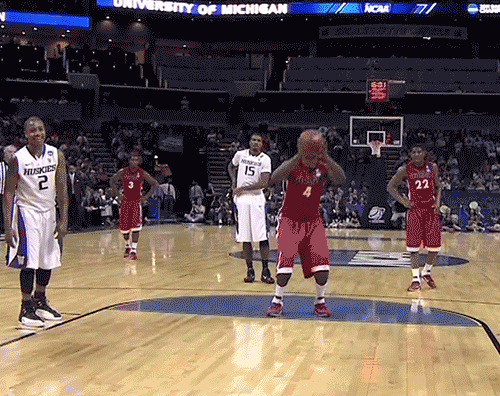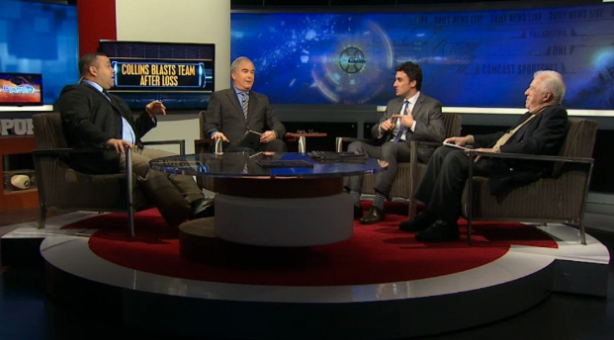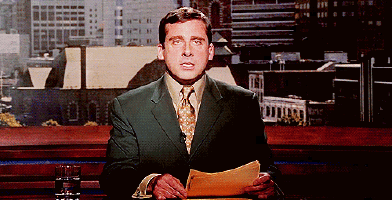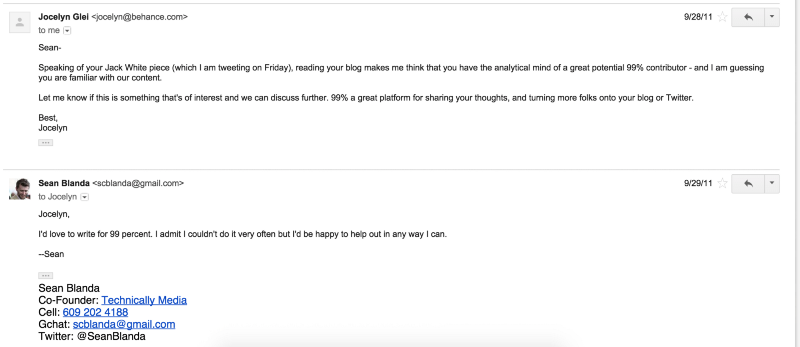I Had Help.

Earlier this month at the 99U Conference, ThinkUp co-founder Anil Dash spoke on the trajectory of careers:
“Someone opened the door for you, they replied to your email, had coffee with you, interviewed you…that’s something that changed the direction of your career,” he said.
He challenged the audience to share with the world the people that gave us the opportunities to advance our career. The effect, he reasoned, is that it will inspire those who may wish to walk some part of our path while providing transparency for how people actually find success. Additionally, it’s just plain nice to thank the people that got you to where you are today.
What follows is my attempt to share a small slice of the lucky breaks, kind souls, and pure coincidences that led to my current working life. This, of course, not meant to imply I’ve “made it” or that my journey is all that special. Instead, it is meant to openly acknowledge that if a few things didn’t break my way, and a few people didn’t lend me a hand, my life would be much, much different.
0–17

When I was younger I wanted to be a basketball player. Surprisingly, by age ten, this wasn’t going so well. The final nail in the coffin occurred when my fourth grade class at Oaklyn Public School was assigned to write a “persuasive essay” about a topic we were passionate about. My topic? School uniforms.
There was a rumor that Oaklyn was going to make the switch to uniforms and, having just been freed from the tyranny of having to wear a green sweater vest every day at my previous school, I wasn’t too thrilled. For the first time in my life, I wrote angry. My main points were mostly about the suppression of individuality and how damn uncomfortable it was to wear the same thing regardless of the season.
After the assignment my teacher, Tina Wells, asked me to read my essay in front of the class and told me I had changed her mind from pro-uniform to anti-uniform. It was the earliest I can remember someone supporting my writing who wasn’t legally obligated to do so. As I write this, I have discovered that Mrs. Wells passed away in 2008, but not before being named Teacher of the Year for Camden County, New Jersey. Thank you, Mrs. Wells.
—

By high school, my common response to “What do you want to do when you grow up?” was “Write and get paid for it.” My idols were the columnists for the Philadelphia Daily News, the tabloid paper in Philly that perfectly captures the city’s hate/love/hate attitude toward its sports teams. I emailed Bill Conlin, my personal favorite, and asked him what college he attended and what was his major so I could be just like him. He kindly responded with one sentence: I studied journalism at Temple University. I took my SAT once, barely cleared what was required to attend Temple and applied for early admission. I was accepted October my senior year and I never applied to another school.
17–21
Once at Temple, I abandoned my goal of becoming a sports writer after speaking with upperclassmen who interned at newspapers. Turns out, athletes never say anything interesting, you’re always on the road, and there’s nothing compelling to write about for 95% of sporting events. Searching for a new niche and with Mrs. Wells in the back of my mind, I went to an open meeting of the campus newspaper, The Temple News, and signed up to write for the opinion section.
The editor, Brandon Lausch allowed a punk-ass freshman to write about the upcoming election. Over the course of the following few semesters Brandon graciously saved me from several embarrassing essays, was extremely patient, and pushed me to be better. He taught me how to throw my fastball and even got me my first journalism internship at the Metro. To this day, he’s still making the lives of Temple students better as a director of communications there. Thank you, Brandon.
—
My sophomore year, I took Multimedia and Journalism. The class was mostly a means of teaching journalism majors how to use Dreamweaver and Flash (skills I still use today!). In the middle of one assignment, the adjunct leaned over my shoulder and asked, “What are you doing this summer?” The adjunct was Pankaj Paul, managing editor at The News Journal, Gannett’s Delaware paper. After that semester, Pankaj threw me in the middle of his newsroom and challenged me to build a website to target the area’s young people. I failed spectacularly, but Pankaj supported me the entire time even when some other members of his staff openly questioned why I (and the other interns) were even there. He didn’t have to go to bat for me, and he did. Along with David Ledford, Andre Smith, and Major Highfield I will forever be grateful to Pankaj for giving me my first “real world” media experience based on a class project. Thank you Pankaj.
—
My senior year I accomplished a life long dream: I became an intern at the Philadelphia Daily News, the very paper that helped spark my love of writing. Two people to thank there: One is David Gambacorta. As an intern I was assigned to write about a police officer and Dave drove me to the officer’s station. The officer invited me back to the holding cell area to tell me about his story (I now forget the story and why it was important that I was told near the cell). When he was introducing himself and making small talk, I remember feeling entirely out of my league. It was my first “hard news” story I reported on in my life, and I was terrified that the officer wouldn’t take me seriously. It was like I was playing reporter, rather than actually reporting. I seized up, unable to ask the officer any question.

Rather than let me whither and look like a fool, Dave graciously stepped in and asked the first question to kick off the interview and then backed away so the officer would answer me directly. It was a small gesture but one that I’ll always remember. Thank you, Dave.
One of my mentors at the DN was VP Wendy Warren. Wendy shepherded me through the newspaper world and was more encouraging than someone as busy as her had to be. She treated me as a peer, and not some Temple student. I eventually had to quit the internship after a month for financial reasons, and she never held it against me. Instead, along with colleagues Chris Krewson and Jim MacMillan, she continued to support me throughout her time in Philadelphia, especially encouraging my co-founders and I to think bigger when we created Technically Philly. Thank you, Wendy.
—
During my final two years in college, I kept a personal blog where I wrote about my take on the state of the “newspaper industry.” Only a small handful of times did a blog post get more than 200 reads. One of the site’s readers was Paul Conley, a B2B publishing consultant and former publishing executive. Paul often would offer me feedback on my takes and encouraged me to keep at it. Here’s one post where I foolishly suggested tech was the only niche in online media and Paul took me to school, publicly.
22
After graduating college and spending what little money I had to travel, I moved home and began to attempt to cobble together a freelancing career because nobody was hiring writers. Moving home made me feel like a failure and I began thrashing around a bit, starting a failed shopping blog called Consumer Whore, helping my friend Christopher Wink with the tech and hosting set up for a failed Philly rap news site called Ming Shooters, and a tech news website called Technically Philly. With a few hundred dollars coming in a month from some freelance web design projects, I moved to a Philadelphia warehouse in Port Richmond with six artists where the rent was $375/month including utilities. I was living on my credit cards and I got dangerously close to maxing them out. After a few months with no new jobs, I was ready to declare failure and move home once more when Paul emailed me:

Above is one of the most important emails of my life. With out it, I would have surely moved back home and given up on trying to write for a living. Of all the people to thank, it’s Paul Conley who most directly saved my career. Later in the email thread, Paul would connect me with Prescott Shibles as he built his staff for Vital Business Media — a media startup in NYC that ended up hiring me for my first job out of college. Thank you, Paul.
23–25
While working for Vital, Technically Philly was evolving from a tiny side project to an honest-to-god publication that people actually read. The problem? It was taking a ton of time and no one was making any money. I could write an entire book about how my co-founders Christopher Wink and Brian James Kirk have positively affected my life. But we met on July 8th, 2010 to get serious about making money. I remember the exact date, because I got a news alert in the middle of the meeting revealing that LeBron James had chosen to sign with the Miami Heat. Sports!
The three of us made a short list of ways we believed Technically Philly could be sustainable and told ourselves that once we got to the end of that list, we’d quit. Luckily, we never did and that is entirely because of the heroic work of Chris and Brian. I consider myself extremely lucky to have had a short stint working with two of the smartest, most hardworking guys in America — and they continue to inspire and motivate me to be better. Thank you, Chris and Brian.
The first person to purchase an ad from us was Tracey Welson-Rossman. Our big break financially came when Chris met with the National Constitution Center’s then-CEO David Eisner and somehow convinced him that three recent college grads could help his multi-million dollar institution create its own blog. David agreed, hired the three of us, and Constitution Daily was born. With the money, I was able to be the first person to quit my day job and work on our company full time. Under the leadership of Chris and Brian, Technically Philly is now the Technical.ly network with more than 10 employees in multiple cities and it started, in part, because Tracey and David took a chance. Thank you.
25–28
A few years in, I decided to move on from Technically Philly and didn’t know what I wanted to do next. One of my strategies was to go to events outside of the tech and media fields I tended to circle around. I applied to attend the 99% Conference in 2012 as a “fellow” at a discounted rate. Director Jocelyn Glei approved my application and emailed me and asked if I’d also be interested in writing for the site.

Later that Summer, job-less and after a bit of traveling I was ready for the next thing. After deciding I didn’t have the stomach to start another business so soon, I made a list of companies I respected and checked if each was hiring. I was blown away by the 99% Conference so Behance was on my list. I stumbled across a job posting for an Associate Editor by Jocelyn and emailed her to see if she was still looking. She was, and she called me the next day, a Friday. She then immediately invited me to NYC for an interview the following Monday. Despite not having a boss for the previous two years and despite not knowing much about the design world, Jocelyn took a chance on me, making me 99%’s second-ever hire and employee number 33(ish) at Behance with the email below:

In the time since, Jocelyn has become one of my life’s great mentors and friends making me a better editor and, most importantly, a more well-rounded person. I’ll forever be in debt to her for taking a flier on some dude from Philly she met over email.
And, just two months ago, she trusted in me enough to step down and hand the reigns over to me. Thank you, Jocelyn.
—
When it comes to our careers, the thing that often holds us back isn’t necessarily money or education. It’s access. It’s knowing what success even looks like and how it happens.
Any success or good fortune I’ve managed to have is because the people above (and many many others) lent me a hand. They encouraged me, they became my partners, and they challenged me to be better.
True to Anil’s challenge, it’s all of our responsibility to pay it forward. So, if you’ve read this far and believe that I can help you in some way, no matter how small, please email me: scblanda@gmail.com and I promise to do what I can.